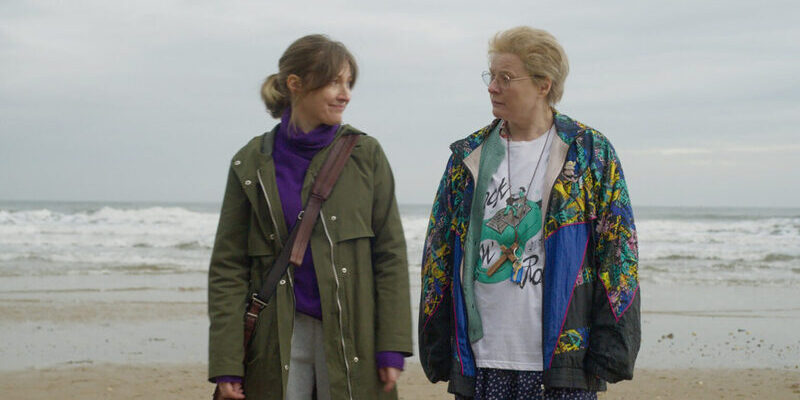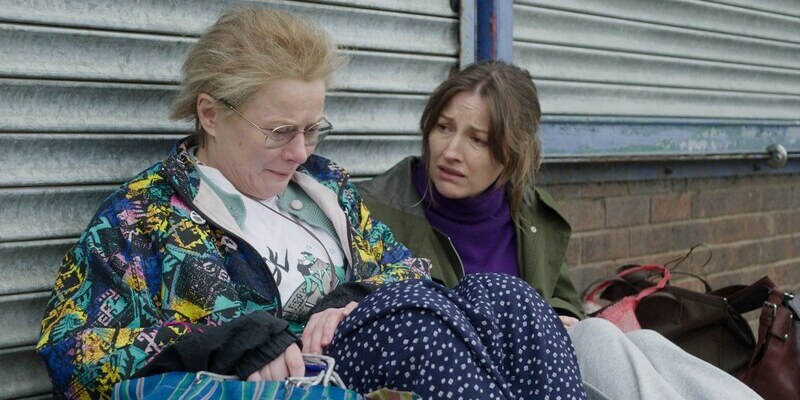
Review by
Benjamin Poole
Directed by: Carol Morley
Starring: Monica Dolan, Kelly Macdonald, Gina McKee, Kieran
Bew, Christine Bottomley

In 2015 filmmaker Carol Morley was awarded Screenwriting
Fellowship from the Wellcome Trust - an organisation dedicated to
"research into life, health and wellbeing" - and was subsequently granted
access to their archives, including voluminous material from British
artist Audrey Amiss. Amiss was a sufferer of paranoid schizophrenia and
had a bipolar disorder, which meant that she was hospitalised for large
periods of her working life with her art re-discovered and recognised
following her death in 2013. According to critic Eilís Doolan, Amiss was
"a woman wholly preoccupied with artmaking, collecting, and recording," an
artist whose entire reality was committed to creating meaning from her
context, to seeing the patterns and significance in all that surrounds us:
her scrapbooks constitute painstaking evaluation of the everyday, such as
witty deconstructions of food labelling to collections of tickets
annotated with their significance to Amiss (with her apparent fascination
of pop culture and postmodern awareness, if she had been born in NY and
not Sunderland she would perhaps be described as Warholian). Her actual
art is beautifully simplistic in that way that only the truly gifted
achieve: watercolour strokes and sharp charcoal strikes delineating people
on the tube, in the park, etc. An overlooked genius, it is no wonder that
Morley, whose previous work includes the documentary
Dreams of a Life, was instantly smitten with Amiss' work and biography.

In the Q&A following the preview screening (in pleasing congruity
with Typist Pirate Artist King's narrative, Morley is touring cinemas across Britain with the film),
Morley reasoned that she wanted to make
Typist Pirate Artist King as a fictionalised account of
Audrey and her psychiatric nurse (played respectively by god
Monica Dolan and Kelly Macdonald, two of our absolute
favourites) travelling cross country to exhibit Amiss' work in a gallery,
as Amiss "wouldn't have liked people talking about her."
It is synchronous that Amiss, who lived her life within art, becomes art,
and much like the bricolage craft which Amiss manufactured, Morley's film
takes a similar scrapbook approach. In the film's early scenes, Audrey's
life and precarious mental state is expressed via vivid expressionism of
woozy red lighting and the pointed symbolism of blobs of black paint. As
the narrative continues we pass through social realism, comedy, and a
specifically British approach to character (à la Alan Bennett or Victoria
Wood); all of which is communicated within a road movie structure.

Could it be argued that Audrey herself, via Dolan's chameleonic unvain
performance, is a deconstruction of the insidious manic pixie girl
archetype? As the film progresses we laugh with Audrey and her off-kilter
approach to the world - her cavalier approach to social etiquette, her
impeachable drive to create - but the film crucially allows us to be
frustrated by her antics, and even scared for her (the most terrifying
aspect of being with someone with acute psychosis is the helplessness you
experience knowing that there is little you can do apart from stay calm,
be soothing and hope against hope that the episode soon passes). A
recognisably harrowing scene takes place at a hotel reception, where we
see the full implications of Audrey's illness.
Typist Pirate Artist King affects due to the meticulous
balance of Dolan's performance and Morley's sensitive direction.

With her calm severity Macdonald is a perfect foil for the histrionics of
Dolan's performance (Macdonald's voice: so peaceful), a veritable saint
who negotiates Audrey through the picaresque of the journey (remember we
clapped the NHS every week, made such a big deal of how heroic our nurses
are, and then didn't really bother to pipe up when it faced further cuts?
Keep clapping, yeah?). We see Audrey interact with a cross section of
British society, and ultimately face up to the past in the welcome form of
Gina McKee, in a road journey which probes polysemic emotion. Will
Audrey and Sandra make it to MacGuffin gallery? If they don't, then there
is comfort in the curation Typist Pirate Artist King offers:
featuring frequent intertitles of Amiss' miscellaneous projects, the film
itself becomes an exhibition of this overlooked artist, finally restoring
the status her work deserves.

